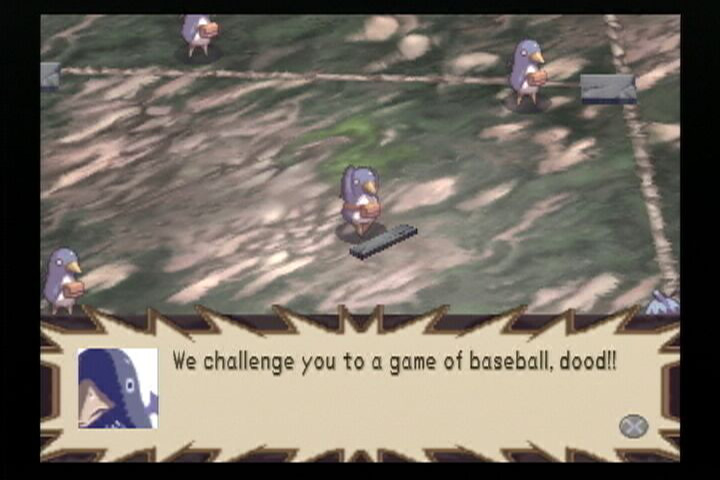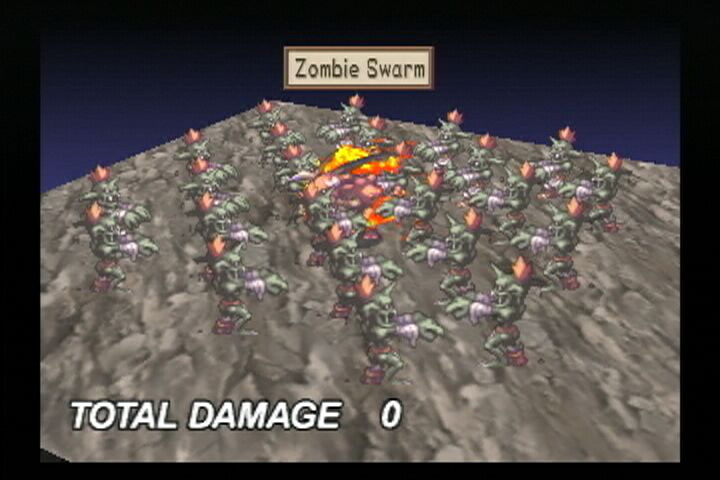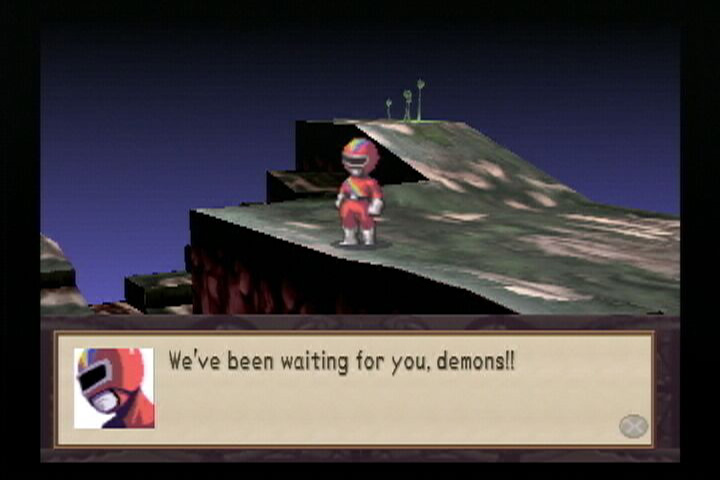|
|

|
BATTLE SYSTEM
|

|
INTERACTION
|

|
ORIGINALITY
|

|
STORY
|

|
MUSIC & SOUND
|

|
VISUALS
|

|
CHALLENGE
|
EASY
|
COMPLETION TIME
|
20-100 HOURS
|
|
OVERALL
4.0/5
|
Rating definitions
|
|
|
The world of games is a crazy place indeed. Some games like Chrono Trigger go ages without a sequel, or even a hint of a sequel, despite the fact that they are widely recognized to be among the upper percentile of RPGs. On the other hand, some games, such as Rhapsody: a Musical Adventure, are for reasons unknown, immediately given several. Now, why anyone would make a sequel to Rhapsody is a bizarre enough thing in itself; indeed, there was little in the game to suggest a worthwhile second outing, and while it can be argued that a burning desire for self-improvement was at the heart of the decision, that argument is somewhat suspect, given the fact that pretty much anything would represent an improvement over the original, thereby negating any room for growth implicit in the operation. Even so, the fact remains, even more bizarrely, that not one, but several sequels have since come through the Marl's Kingdom pipeline. Strangest of all is the fact that each subsequent outing has vastly improved upon its predecessors, leaving us with the exceedingly well-rounded package that is Disgaea: Hour of Darkness.
Gamers start things off watching a short vignette explaining the current situation in the Netherworld, where much of Disgaea takes place; King Krichevskoy, the demon lord, has managed to die, leading to general chaos as assorted demons vye for leadership. In the meanwhile, his son, Laharl, has hunkered down for a ten-day nap, which lasted a little longer than expected. Players will get their first look at the characters as Etna, Laharl's dodgy vassal and sidekick, tries desperately to wake him up using some fairly unconventional means (or to kill him, as it's a little unclear exactly what Etna's intentions are, even to herself). This is a sign of things to come; right off the bat, Disgaea is all about the wacky humor, and unlike many games that try, and fail, to employ this type of comedy, Disgaea is exceedingly good at it, which helps to leaven a combat system that, while engaging, can easily grow repetitive.
At its heart, Disgaea is a standard, run-of-the-mill tactical RPG, but its most appealing aspect is the fact that the conventional system found in most T-RPGs has been tweaked so that battles proceed quickly and with a minimum of mess. For instance, all enemy attacks trigger at once, which itself speeds things up significantly. While some of the game's maps are quite large, this is counteracted by the fact that characters can throw each other around, which eats up distance nicely when combined with ranged attacks. Of the latter there are plenty, scattered among more than a dozen different character classes. Players can gain characters in one of three ways: plot-based heroes that join through story sequences, enemies that are captured during fights in the Item World, a sprawling area of random dungeons contained inside each of the game's items, and characters created at the Demonic Assembly.
The Demonic Assembly is the Netherworld's equivalent of parliament, and unlike the earthly version of politics, demons don't even pretend to play fair. Laharl must exert influence through spending mana points gained in combat from kills in order to even present resolutions, and from there things only get murkier; players can bribe senators with items from inventory, and if things still don't go their way, it is possible to beat the unruly legislators into submission until an act is passed. Acts range from changing inventory and inventory prices, to changing the difficulty level of monsters, to creating characters, to unlocking hidden game areas, and advanced players will spend a fair amount of time begging, bribing, cajoling, and fighting their way towards victory in order to tailor a unique game experience.
 Baseball is more exciting when the pitcher explodes
Baseball is more exciting when the pitcher explodes
|
|
Creating characters is one of the easier things to do, and players can either start from scratch with new hirelings or get characters promoted in the assembly until they are able to Transmigrate, which returns them to level 1, but with higher stats, abilities held over from their previous level, and a better rate of statistical increases. It also allows for character classes to be combined, although most abilities are confined to the weapons they are learned with.
Indeed, the abilities characters learn come from one of three areas: the weapons they equip, their job classes, and the characters they have themselves created in the Demonic Assembly. Classes such as Skull and Priest learn their spells as they level up, and subsequently improve their range with use, while weapon-based fighters learn skills through fighting with the assorted weapons the game has to offer (there are nine classes filled with a wide variety of items, each bearing an off-color description such as that found on the Poison Knuckles, which sagely advises players "not to pick [their] nose with [it]"). Any class can use any weapon, but each comes with a preferred weapon that receives significant bonuses to attacking, making it sensible to keep characters conventionally armed. Finally, it is possible to leech abilities off of underlings created at the Demonic Assembly; this is very time-consuming, however, and while it is nice to have a fighter equipped with a healing spell, it is probably easier to transmigrate the character to a priest for a few levels than to have to cast the spell ten or fifteen times, while standing beside a priestly underling, in order to learn it by osmosis.
Fighting on the grid is fairly simple, but a few twists are thrown in to keep things interesting. Unfortunately, the AI is none too impressive; enemies often kill each other in their frenzied attempts to get at Laharl and friends, and while their aggressiveness does mean that few battles will result in players trekking across a large expanse just to kill one monster, it also means that enemies will proceed heedless of obstacles in their paths. Additionally, this amazing sense of direction is curiously disabled on some maps, as it is possible to hide in plain sight, just a few panels away from an enemy. The net result of these problems, combined with a fairly generous bonus system that keeps players swimming in high-level items from the get-go, is that Disgaea isn't very difficult. Tbere is also a Geo Panel system, whereby the panels in the game's grid will assume a pattern of various colors at random each time a new level loads. Depending on the placement of Geo Panels, randomly colored bits of rock that can be moved around by players, all panels of the color upon which a Geo Panel is resting will accrue various effects; some will heal players, others will damage them, and others still will make them invincible or increase the amount of HL, the game's currency, gained from killing enemies. Destroying the Geo Panels will cause the colored panels to change to the color of the Geo Panel, and if more than one Geo Panel is on a given color, it is possible to trigger a chain combo, which counts escalating points for each block thusly changed, along with damaging severely anything sitting on those colored blocks. The total score of this combo is then converted into points on the bonus meter, which itself is converted into items at the end of each battle, depending upon at what level the gauge is set (it is possible to obtain up to ten items on any level, save for those in the Demonic Assembly).
 Surprisingly easy to fight off sans shotgun
Surprisingly easy to fight off sans shotgun
|
|
At any rate, most advanced Geo Panel tactics will take place in the Item World; none of the maps involved in the game's storyline are particularly challenging, and most end up with no possibility for Geo Panel trickery to occur. The other feature unique to the Item World is the presence of specialists contained within most items. These specialists add additional bonuses to items and if they are defeated while in the item world, they can be moved from item to item, allowing players to craft weapons that augment characters perfectly.
All this takes place on a 3D field with 2D sprites for characters and a 2-dimensional background image to fill in the spaces. It's not exactly the most modern approach to graphics, but this should not be taken to mean that it isn't attractive, because Disgaea, while distinctly low-tech, is very well polished and is not hard on the eyes. It's also a true pleasure for the ears, as the soundtrack combines pop music with various classical pieces and the occasional oddity to deliver an outstanding package. The only difficulty is, the Item World employs but a single track on nine out of every ten floors, which only serves to emphasize the game's repetitiveness after spending a few hours levelling up. This is but a minor quibble, however, and the sound is otherwise spotless; even the voice acting is well-done, despite the presence of a stinker or two on the cast that could easily have mucked it up. Disgaea's irreverence ultimately covers for a multitude of minor sins, and the game's presentation is spotless, which doesn't hurt.
This irreverence could not have been adequately conveyed without a spot-on translation, and as per usual, NIS and Atlus do not disappoint. One of the few truly funny RPGs out there, Disgaea features a number of laugh-out-loud moments, and some of the predicaments faced by Laharl, Etna, and the various riffraff they pick up along the way, from an Angel trainee who cheerfully announces that she's an assassin to a Defender of Earth who just can't get enough of picnicking, only add to the ribaldry. The only discernable error in the script is the use of the term "alright", which is an unfortunate usage that is sometimes overlooked even by publications. Beyond that, it is a spotless job, and it is housed in a pretty spotless interface. Disgaea's menus are easy to access, and the shops include a welcome "Try it on" option allowing players to accessorize with style among a roster of characters that can grow into the dozens.
 Because every game should have a Power Ranger
Because every game should have a Power Ranger
|
|
It is very easy to knock out a substandard TRPG, and it is to NIS's credit that it has become a leading name in this genre. Disgaea was really the title that announced the company's emergence, and part of the reason was its willingness to do away with the standard elements of the genre. Slow-paced battles turn into quick affairs that nonetheless retain a fair amount of strategy, the world map is replaced by a central location from which players do battle, and random encounters are solved by the highly addictive item world. Add to that the geo panels, the Demonic Assembly, and the various other extras that enter into the equation, and it's easy to see why Disgaea was such a surprise hit on its release.
Of course, the number one reason for that success is probably the story, which is bar none the most irreverent romp that still manages to retain a certain element of seriousness and dignity. Each chapter begins with a vignette in which the main characters mock the upcoming events in what is styled as an advertisement for a cartoon, and the actual plot itself often descends into this kind of lunacy all by itself. A recurring character called Mid-Boss continually pesters Laharl at every turn, Angel Assassins wax eloquent about the power of love while staring down the barrel of a giant cannon, Power Rangers make cameo appearances, and the penguin-esque Prinnies that cheerfully explode through every chapter all combine to add that certain something. More than anything else, the storyline is what makes Disgaea, and though it is not the source of most of the game's gameplay, it is the source of its soul.
There is very little not to like about Disgaea, in the end; while the battle system is simplistic and the enemies stone-stupid, every other part of the package has been polished till it shines, and with a humorous story, addictive gameplay, and potentially endless hours of fun, there are few titles that offer the bang for buck that Disgaea does. While it was originally the victim of a limited release, its success prompted Atlus to reissue the title, and so it should be fairly easy to pick it up. Failing to do so means failing to cash in on countless hours of enjoyment, and this, more than anything, should be reason enough to pick it up. Well, that and there are no musical numbers sung by demented frogs.
Review Archives
|









